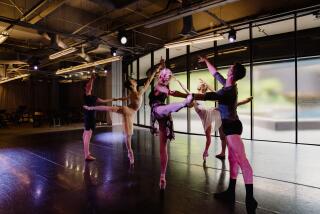American Repertory Dances From Memories
Though it has concentrated on modern dance pioneers, the American Repertory Dance Company has never ignored living choreographers. But a wholly contemporary program gave the company problems that it couldnât completely solve Saturday in its finely danced performance at UCLAâs Schoenberg Hall.
For starters, audiences get plenty of opportunities to see works by Lar Lubovitch, Mark Morris, Susan Marshall and other choreographers included on the eight-part program, which makes American Rep far less indispensable than when it performs rarities. Moreover, the conservative and often backdated techniques and creative visions on the program left the eventâs umbrella title, âGeneration Next,â highly questionable. Next to what? Not to the generation of pioneers. And definitely not to the generation of innovators now updating the art.
Curiously, feelings and relationships were portrayed not in the present tense but as memories in more than half the pieces. Itâs something that dance does well but that can lead to a deadly passivity when overemphasized.
In Christopher Pilafianâs intense tango solo, âMomentoâ (music by Astor Piazzola), Nancy Colahanâs restless prowling and despairing collapses to the floor evoked the destructive reexperiencing of pain, just as her rapturous and even blushing characterization in Lubovitchâs brief, fluid Mozart solo âPardon My Affectionâ (from âThis Is Allâ) suggested a happier past.
In Mark Dendyâs enigmatic âThe Visitâ (music by Philip Glass), Bonnie Oda Homsey feverishly writhed in a chair until John Pennington materialized--hovering over her, cradling her, manipulating her rather like a puppet master and then vanishing.
The Homsey-Pennington relationship proved even more mysterious in the strongest work on the program: Marshallâs âEntrâActe IIâ (to more music by Glass), in which disappearances by one or the other and repetitions of previous actions suggested a memory loop being played, rewound and replayed.
Memory-dancing loomed largest in Jeff Slaytonâs heartfelt, previously reviewed âRemembering Viola,â a tribute to his late wife, dancer-choreographer Viola Farber, in which he sometimes danced alongside vintage films of himself in a duet with her.
Slaytonâs new âTrio Sweep,â however, banished the past in favor of vibrant, elegant, lyric interaction between Homsey, Susan Gladstone and Diana MacNeil to original music by Eric Ruskin.
Colin Connorâs whimsical âNo, Resistance Is but Vainâ (from âThe Rye Catchersâ) borrowed Mark Morris methodology by creating gestural motifs from images in the texts of the Purcell arias that accompanied the dancing.
Finally, Morrisâ own âGreek to Meâ solo found Peter Wing Healey exploring antique poses and flurries of complex steps to Harry Partchâs studies of three ancient scales.
As always, the dancing skill remained exemplary Saturday, but nothing seized the eye or imagination with the force of the American Repâs greatest golden oldies--or, for that matter, the glimpses of Merce Cunninghamâs âSeptetâ in the Slayton-Farber film.
More to Read
The biggest entertainment stories
Get our big stories about Hollywood, film, television, music, arts, culture and more right in your inbox as soon as they publish.
You may occasionally receive promotional content from the Los Angeles Times.










